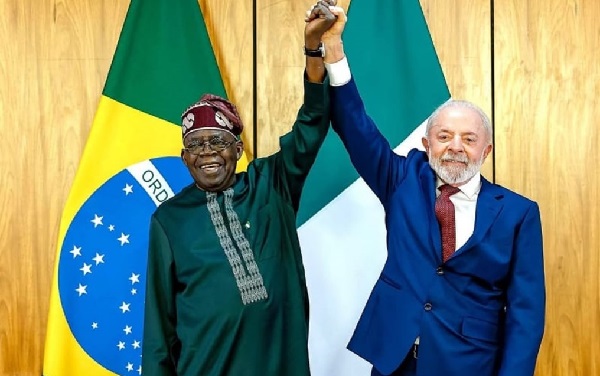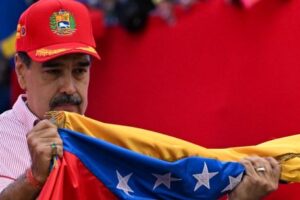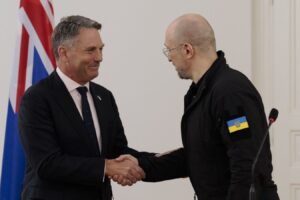
By Keem Abdul
There is something about Brazil that any Nigerian with some knowledge of the world can relate with – and that is the many commonalities the two countries share. These commonalities exist in almost every area – but especially in those of geography, history and culture.
And they’re not skin-deep, either; indeed, they are profound.
The Federative Republic of Brazil is the most populous country and largest economy in S/America, just as the Federal Republic of Nigeria is the most populous country and one of the largest economies in Africa (a position which has conferred on each country enormous clout within its region). Both countries’ commercial hubs, Sao Paulo and Lagos, are the largest cities on their respective continents. Both countries, whose populations are roughly the same, boast a staggering demographic diversity – Nigeria with its over 200 ethnic nationalities, and Brazil with its racial diversity, from aboriginal ‘Red Indian’ tribes in the Amazon, to descendants of European (especially Portuguese) colonizers and migrants, to descendants of former African slaves – most of whom, especially in the state of Bahia in the country’s northeast, have retained their African identity, cultural and even traditional religious practices (such as traditional Yoruba practices such as Ifa divination).
Both countries belong to the so-called Global South – emerging economies seeking a place on the global stage commensurate with their growing aspirations as far as economic growth, industrialization and sustainable development are concerned: Brazil as a leader in the club known as BRICS (acronym for ‘Brazil, Russia, India, China and South’) and Nigeria as the arrowhead of ECOWAS, the West African sub-regional economic grouping. Both countries’ experiments with demographic governance have been frequently interrupted by long spells of military rule in the past. And at different times, Nigeria and Brazil saw fit to move their respective capitals from bustling coastal cities to virgin locations in the interior; Brazil from Rio de Janeiro to Brasilia in 1960, and Nigeria from Lagos to Abuja in 1991.
And in their respective Presidents – Bola Ahmed Tinubu and Luis Inacio da Silva (better known by his nickname, Lula) – each country is led by a political maverick with a history of activism and a penchant for bold reform. The engagement between Tinubu and Lula on the occasion of the former’s state visit to Brazil can, therefore, be said to be a meeting between two kindred spirits.
More importantly, though, it was a meeting between two nations who, apart from the commonalities cited above, also share a desire to cultivate strategic global partnerships and broaden their alliances in a multipolar world and an increasingly uncertain geo-political environment. Though this is Tinubu’s third trip to Brazil since his assumption of office, it was far more significant than the previous two, which were centered around international summits like the G20 and BRICS meetings, while the latest was focused on bilateral agreements. It was an opportunity for Nigeria to derive tangible and intangible benefits from Brazil’s global leadership in mechanized agriculture, agribusiness and renewable energy in its quest for economic diversification, and its desire to engender mutually-beneficial investments to boost Nigeria’s growth and global standing.
Speaking of agreements and deals, it was a visit of many highlights. Five MOUs were signed in the areas of foreign affairs, aviation, science and technology, agriculture, and cultural exchange. One highlight, for example, was the Bilateral Air Services Agreement (BASA) which henceforth would enable direct commercial flights between Nigeria and Brazil – a development which is projected to reduce travel time between the two countries from over 24 hours to just seven; already, an inaugural symbolic flight by the Nigerian carrier Air Peace took the Nigerian delegation from Brasília to Lagos shortly after the Tinubu/Lula meetings. Signed by the two Presidents and their respective ministers of aviation, the agreement, according to the Presidency, was an unequivocal demonstration that Nigerian carriers can compete on global routes, and that Nigeria’s partnerships – especially under Tinubu – can deliver immediate results.
Indeed, in the aftermath of the BASA agreement, Air Peace and Caverton, another Nigerian carrier, will commence passenger and cargo services, respectively, on the Lagos-São Paulo route from the last quarter of 2025; a clear signal of their readiness to operationalize this potentially profitable corridor. In a further strengthening of aviation and trade ties between the two nations, Air Peace ordered 21 Embraer jets from Brazil on the sidelines of the President’s visit.
All in all, according to insiders, the trip is set to unlock $30bn in new Brazilian investments in the Nigerian economy – which is a key component of the Nigerian leader’s Renewed Hope Agenda, aimed at opening new markets, strengthening Global South cooperation, and creating opportunities for Nigerian businesses and travellers.
In a further affirmation of Brazil’s deep cultural affinity with Africa (and especially Nigeria), President Lula also hosted one of Nigeria’s foremost literary icons, the Nobel laureate Prof. Wole Soyinka in a meeting at the presidential palace in Brasilia that highlighted a unique Afro-Brazilian heritage.
In the meeting, during which Soyinka presented the Portuguese language version of his seminal essay, Myth, Literature and the African World to Lula (a latter-day bibliophile who, according to his bio, did not learn to read until he was 10 – no thanks to his poverty-stricken childhood) the two men shared their views on the role of literature, history, and education in bridging cultures and fostering mutual understanding. Sources say the Soyinka visit is part of a broader effort by Lula to deepen intellectual and cultural cooperation among the nations of the Global South, with Brazil leading the charge through engagements with African thinkers, artists, and cultural institutions.
Along with the successes recorded with Tinubu and his team, the Soyinka engagement was very much in line with Lula’s vision of Brazil’s ‘soft-power’ role on the world stage. When, in 2007, Brazil won its bid to host the 2014 FIFA World Cup, and followed that up, just two years later, with the right to host the 2016 Olympic Games in Rio de Janeiro, Lula – then serving his first term – saw it as an affirmation by the global community of his country’s pedigree. He declared triumphantly on one of those occasions, “We are now a world-class country.”
In spite of its current challenges, Nigeria, too, has the makings of a world-class country, and it is only to be expected that, in partnership with Brazil, the realization of Nigeria’s global aspirations is only a matter of time.





